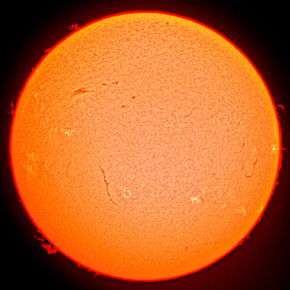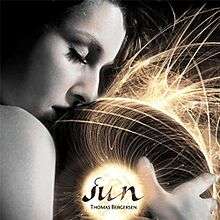
Sun
The Sun (in Greek: Helios, in Latin: Sol) is the star at the center of the Solar System and is by far the most important source of energy for life on Earth. It is a nearly perfect spherical ball of hot plasma, with internal convective motion that generates a magnetic field via a dynamo process. Its diameter is about 109 times that of Earth, and it has a mass about 330,000 times that of Earth, accounting for about 99.86% of the total mass of the Solar System.About three quarters of the Sun's mass consists of hydrogen; the rest is mostly helium, with much smaller quantities of heavier elements, including oxygen, carbon, neon and iron.
The Sun is a G-type main-sequence star (G2V) based on spectral class and it is informally referred to as a yellow dwarf. It formed approximately 4.567 billion years ago from the gravitational collapse of matter within a region of a large molecular cloud. Most of this matter gathered in the center, whereas the rest flattened into an orbiting disk that became the Solar System. The central mass became increasingly hot and dense, eventually initiating nuclear fusion in its core. It is thought that almost all stars form by this process.

Sun (Thomas Bergersen album)
Sun is the second stand-alone production album created by Thomas J. Bergersen from Two Steps from Hell, released on September 30, 2014. The release contains 16 tracks, featuring vocal performances by Merethe Soltvedt, Molly Conole and other vocalists. The album cover and artwork are designed by Bergersen himself. The album was announced for pre-order on September 9 across iTunes, Amazon, and CD Baby, with the tracks "Empire of Angels," "Final Frontier," and "Starchild" made available on iTunes prior to the full release. In addition, a signed limited deluxe edition CD version has been scheduled for somewhere in 2015, set to include additional music, notes on each track written by Thomas, and a large-size poster featuring his artwork.
Track listing
Use in media
The tracks from Two Steps from Hell are frequently used in film trailers and other promotional materials.

Sun (Cat Power album)
Sun is the ninth studio album by American musician Cat Power. Her first album of all-original material since 2006's The Greatest, it was released on September 3, 2012, in the United Kingdom and in the United States on September 4, 2012, via Matador Records. The album was issued in a variety of formats, including a limited edition deluxe LP containing a 7" vinyl of bonus tracks.
The album's lead single, "Ruin", was released for free download at Matador Record's store on June 20, 2012. A music video for album opener "Cherokee", directed by Marshall, was later released, while an ambient remix of the song by Nicolas Jaar is available to download from Cat Power's official website. The song was premièred on NPR's All Songs Considered on June 26, whose host Bob Boilen described the album as "[going in] yet another direction. A lot more drive, a lot more electronics, drum machines, synths—it's very bold."
On April 10, 2013, Cat Power performed the previously unreleased track "Bully" on the opening episode of the forty-second series of Later... with Jools Holland. Immediately following the broadcast, a new version of the album containing "Bully" as a bonus track was made available for download through iTunes.
Palež
Palež can refer to the following place names:

Light skin
Light skin is a naturally occurring human skin color, which has little eumelanin pigmentation and which has been adapted to environments of low UV radiation. Light skin is most commonly found amongst the native populations of Europe as measured through skin reflectance. People with light skin pigmentation are often referred to as white or fair, although these usages can be ambiguous in some countries where it is used to refer specifically to certain ethnic groups or populations.
It has been hypothesized that dark skin pigmentation was the original condition for the genus Homo, including Homo sapiens. However, as populations migrated away from the tropics between 125,000 and 65,000 years ago into areas of low UV radiation, they developed light skin pigmentation as an evolutionary selection acting against vitamin D depletion. Based on ancient DNA analysis conducted in 2014 on human skeletal remains from western Europe, this change from dark to light skin pigmentation likely occurred only recently for at least some Europeans. Paleogenomics researcher Carles Lalueza-Fox of the Pompeu Fabra University in Spain and his colleagues observed that a 7,000-year-old hunter-gatherer from the La Braña-Arintero labyrinthine cave in the Cantabrian Mountains possessed the allele for blue eyes but not the European mutations for lighter skin pigmentation.

Pale (heraldry)
A pale is a term used in heraldic blazon and vexillology to describe a charge on a coat of arms (or flag), that takes the form of a band running vertically down the center of the shield. Writers broadly agree that the width of the pale ranges from about one-fifth to about one-third of the width of the shield, but this width is not fixed. A narrow pale is more likely if it is uncharged, that is, if it does not have other objects placed on it. If charged, the pale is typically wider to allow room for the objects drawn there.
The pale is one of the ordinaries in heraldry, along with the bend, chevron, fess, and chief. There are several other ordinaries and sub-ordinaries.
The word pale originally referred to a picket (a piece of wood much taller than it is wide such as is used to build a picket fence) and it is from the resemblance to this that the heraldic pale derives its name.
Derived terms
Special cases
A pale may be couped ("cut off" at either end, and so not reaching the top or bottom of the shield); however, while other charges if couped at the top would just be blazoned as "couped in chief," the special term for this in the case of the pale is "a pale retrait" (this also applies to pallets; see below). If couped at the bottom it is blazoned as "a pale retrait in base".

Heist (2001 film)
Heist is a 2001 crime film, written and directed by David Mamet, which stars Gene Hackman, Danny DeVito, and Delroy Lindo, with Rebecca Pidgeon, Ricky Jay, and Sam Rockwell in supporting roles.
Plot
Joe Moore runs a ring of professional thieves, which includes Bobby Blane, Don "Pinky" Pincus and Joe's wife Fran. During a daylight robbery of a New York City jewelry store, Joe's face is captured by a security camera after he takes off his mask in an attempt to con/distract the store's last remaining employee. As both the picture and a witness can identify him, Joe chooses to retire from crime and plans to disappear on his sail boat with his wife, living off their share of the heist.
This does not sit well with Joe's fence, Mickey Bergman, who runs a garment business as a front. After accruing a number of expenses in setting up another, much more complicated robbery, Bergman decides to withhold the payment due to Joe and his crew. He insists they go through with the other job — robbing an airplane carrying a large shipment of gold. Bergman further insists that his hot-headed nephew, Jimmy Silk, be a part of the crew.
Podcasts:

Pale sun
by: Cowboy JunkiesFifty miles from Dakota territory
Cheyenne scalp hangs from his belt
Found him alone washing in the Bighorn
A steady aim and he bagged his game
Pale sun falls without contest
Here is obedient darkness
He will not return
White Cadillac, white man at the wheel
White faces on the mountain
Wounds that will never heal
"Black clouds overhead", old man says
"Looks like rain"
Thieves' Road winds to the Black Hills sign
Says South Dakota, U.S.A.
Grass plains stretch to the horizon
Not a soul can be found on them
They will not return
Old rusted pickup and a mad dog in the yard
Purple paint peels but fails to reveal
The bitterness that grows inside
Cloud of dust in the distance
Strange knock beneath my hood
Is it better to have words left unsaid
Than to have words misunderstood?
Pale sun falls without contest
Here is obedient darkness
He'll return, I know he will return
